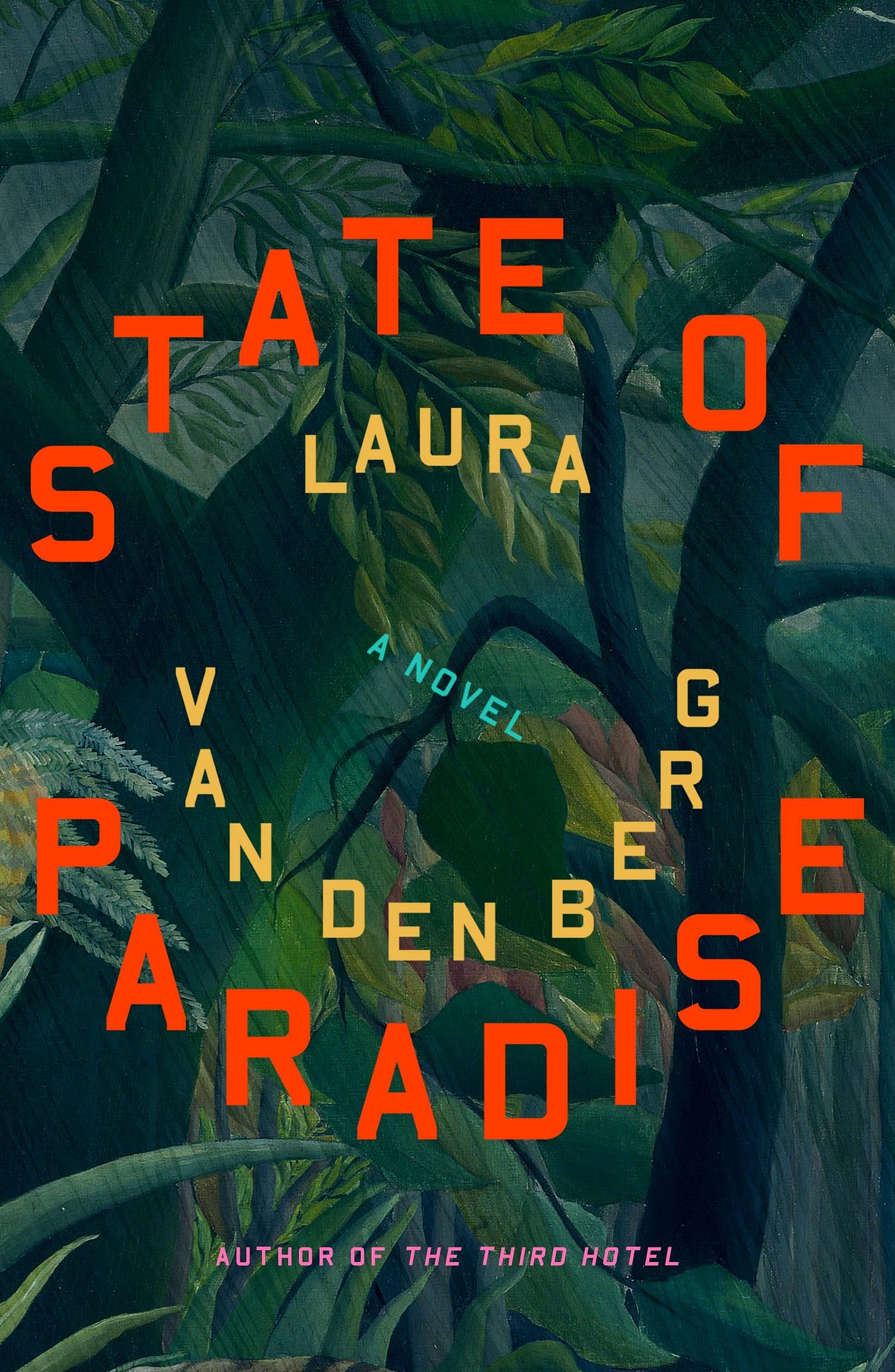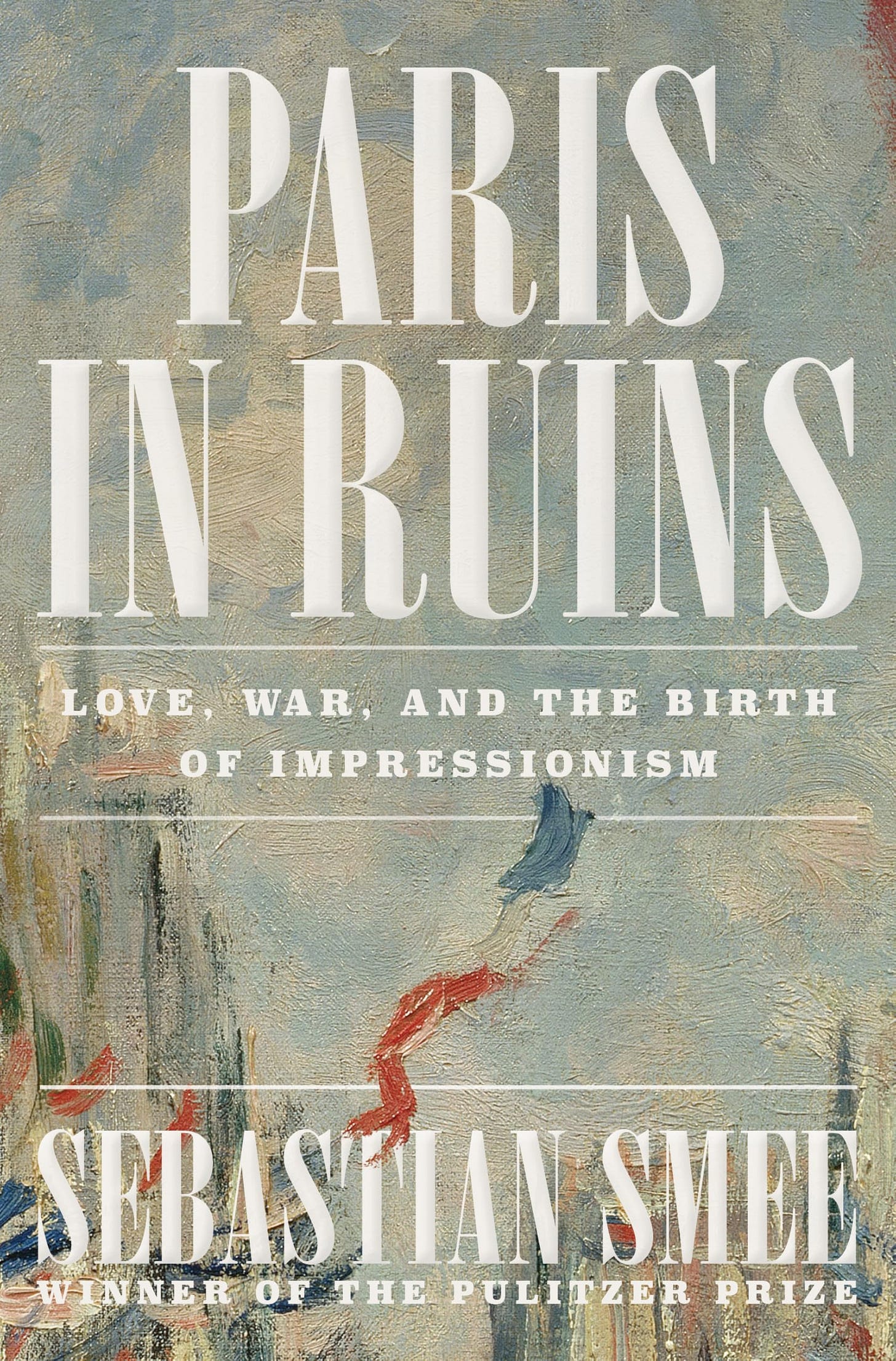Fiona Warnick's "The Skunks" (Tin House, May)
“The Skunks” is a patient, precise debut about a young woman who has returned home for the summer after graduating college. Warnick beautifully evokes the feeling of being in limbo that comes with being on the cusp of adulthood, tangled up in nostalgia for past comforts while tentatively taking steps toward an uncertain future. Isabel, the main character, must come to terms with this tension, occasionally distracting herself from her angst with allusive, allegorical digressions focused on the imagined lives of her backyard wildlife. It's a small story, but full of well-wrought detail and humor, with a really charming voice that elevates it into something special. I strongly recommend.
Laura van den Berg’s “State of Paradise (FSG, July)
In the book, van den Berg uses her home state of Florida as a lens through which to explore the uncanny, aggressively random nature of reality in twenty-first century America, where technology and desperation conspire to fool us into forming grand narratives out of stochastic noise. Her characters, emerging from the trauma and isolation of a pandemic, struggle to cope in a seemingly transformed world. Meanwhile, a cutting-edge virtual reality wellness device promises to wash all their cares away.
In her 2020 collection “I Hold a Wolf by the Ears,” van den Berg used the tropes of psychological horror to illustrate what it’s like to be a woman in contemporary society. With “State of Paradise,” she’s captured the eerie frisson of what it’s like to think you’re living in a glitching simulation, and shows how the overstimulation of algorithmic curation leads to dark correlations and delusional beliefs about the world, about others, and about ourselves.
That said, “State of Paradise” is a bit of a comedown after the extraordinary “The Third Hotel,” and I was surprised by how much “State of Paradise” resembles (or recycles bits of) van den Berg’s similarly fragmented first novel, “Find Me.”
Sebastian Smee’s “Paris In Ruins: Love, War, and the Birth of Impressionism” (W.W. Norton, September)
Blending art criticism, military history, and biography, Smee shows how the traumas of the Franco-Prussian war and the horrors of the Paris Commune of 1871 profoundly affected the development of impressionism. With a particular focus on artists Berthe Morisot and Édouard Manet, Smee depicts a movement struggling to find its way in a beleaguered nation torn apart by extremists on both ends of the political spectrum. Deeply researched and written in a propulsive, almost cinematic style. His conclusion, that the impressionists deliberately cultivated an apolitical, in-the-moment style in reaction to the excesses of both the hard left and hard right, is intriguing, especially today.
Fien Veldman’s “Hard Copy” (Apollo, September)
My favorite book this year—maybe even in my top books of all time? What can I say, it spoke to me.
The book follows an unnamed working class woman who lands a mundane but cushy office job. Anxious about a traumatic past and alienated from her white collar colleagues, she strikes up an obsessive, emotional relationship with her (possibly sentient) desktop printer. Full of Kafkaesque touches and plenty of wry humor, the book satirizes the enervating contradictions of contemporary work, and though it doesn’t directly touch on the current in-office/remote work debate, it does deftly illustrate the corporate cold war between who chafe against the petty absurdities of the office and those who seem to relish them.
Jean Strouse's "Family Romance: John Singer Sargent and the Wertheimers" (FSG, November)
Strouse, known for her biographies of J.P. Morgan and Alice James, uses the relationship between the painter and this up-and-coming family of wealthy, Jewish patrons to illustrate the changes being wrought in English society in the early 20th century. She provides an in-depth look at the paintings, how they came to be, and the backlash they sparked among the aristocratic establishment of the era.
While the book does an admirable job of bringing the Wertheimers' fascinating story to the fore, Strouse struggles to separate the meaningful from the minutiae and relies far too heavily on the research and scholarship of other writers, making for a strangely leaden pastiche of references and discursive anecdotes. Compared to other recent works about Sargent (Paul Fischer's masterful "The Grand Affair") and his subjects (Julian Barnes' "The Man in the Red Coat"), "Family Romance" comes up lacking.
Jonathan Schnell’s “The Village of Ben Suc” (NYRB, November)
Originally published as a series of articles in The New Yorker, Schnell’s slim book documents the raid of the eponymous village by U.S. and South Vietnamese soldiers in 1966. Thousands of villagers were displaced and sent to a makeshift refugee camp while their village was burned to the ground in an effort to deny the Viet Cong a strategic refuge. It sounds dramatic, but the mission proceeds with a cold, almost mechanical banality that only serves to highlight the dubiousness of the American mission in Vietnam.
For a generation raised on the glorious stories of World War II (at least those who missed out on “Catch-22” a few years earlier), “The Village of Ben Suc” must’ve come as a shock. From a contemporary vantage point, however, the story falls a little flat. Schnell set the template for incisive, critical coverage of U.S. military adventures, and almost 60 years later, the shambolic, indifferent approach to war and peace that he describes is all too familiar to those of us who lived through coverage of the wars in Iraq and Afghanistan.
Ella Baxter’s “Woo Woo” (Catapult, December)
I had high hopes for this one, an art-world satire in which the protagonist prepares for an important gallery showing while dodging a menacing stalker and cultivating an imaginary relationship with the ghost of Carolee Schneemann. But it never gelled for me. I think part of the issue is that when Gen Z and thereabouts are depicted in fiction, I’m never fully sure which aspects of the depiction are genuine generational habits and which aspects are exaggerated for satirical purposes. For a book that wants to explore art, the commodification of women’s bodies, and the destructive confluence of the two, I’d recommend Sara Sligar’s “Take Me Apart,” which I think navigated these issues with a little more insight and grace.





![The Skunks [Book] The Skunks [Book]](https://substackcdn.com/image/fetch/$s_!7Ttb!,w_1456,c_limit,f_auto,q_auto:good,fl_progressive:steep/https%3A%2F%2Fsubstack-post-media.s3.amazonaws.com%2Fpublic%2Fimages%2F377aa134-7e0e-4d0f-8336-eff1107abd5a_1500x2325.jpeg)












I wrote my masters thesis on Morisot and Manet and can not wait to pick Paris in Ruins!